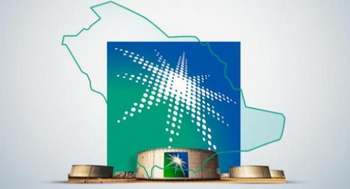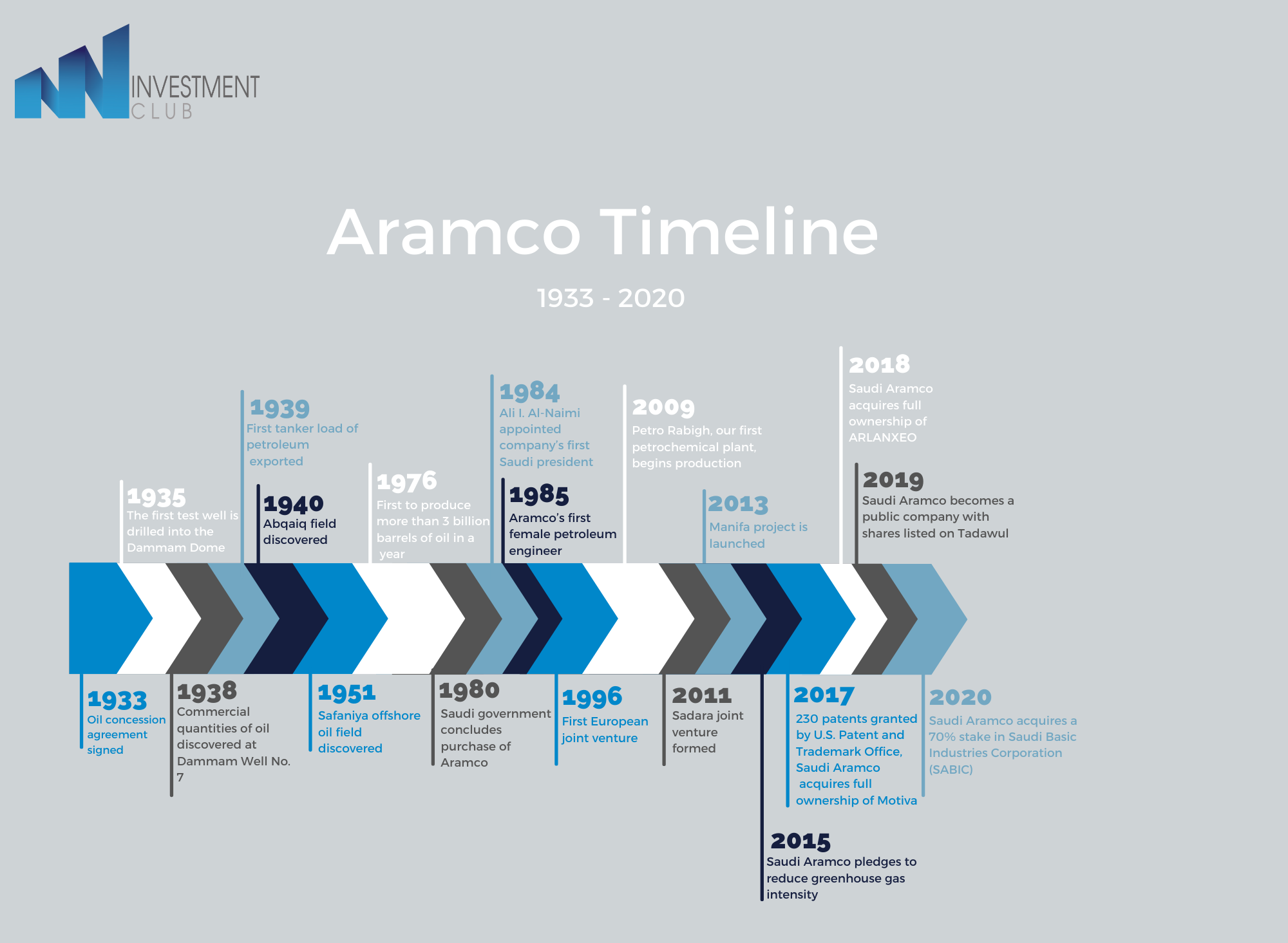Aramco

The story began 91 years ago after oil was discovered in Bahrain. King Abdul Aziz, was then motivated to explore oil inside Saudi Arabia, signing a contract with the American company SOCAL, now known as Chevron Exploration About petroleum, in 1933 AD.
Following this contract, a project management company was established under the name California Arabian Standard Oil (CASCO). The company began its journey in discovering oil in the deserts of the Kingdom, but unfortunately, after two years and with no results achieved, despair reached its climax until SOCAL Company gave up half of its right of exploration concession to another company.
The Saudi guides were leading the American experts from one place to another. After years of searching, they then began to drill in well number one, but after seven months the well failed to produce good quantities of oil, but despite that, they continued to search and identified new drilling sites for six other wells. However, most of these wells failed, except for well No. 7, which was the focus of everyone's attention.
In the midst of everyone's eager anticipation for Well No. 7, the experts were called to an urgent meeting of the company's board of directors in San Francisco to withdraw from the project after a search period that lasted for six years, but a call was received that cut off this meeting, promising the flow of oil from Well No. 7.
"Prosperity Well," well number seven, marked the beginning of goodness for the discovery of new fields of oil and gas.
In the culmination of this great event, King Abdul Aziz, may God have mercy on him, arrived in Dhahran in 1939 AD, where he visited the well site and great celebrations were held near it.
After being named Aramco (Arabian American Oil Company), and with the rapid increase in oil production, it became necessary for the company to expand its business in the distribution sector as well.
In 1950 AD, the company completed the Trans-Arabian Pipeline "Tapline", which has a length of 1,1212 km and is considered the longest in the world. The Tapline line linked the Kingdom's eastern region to the Mediterranean Sea, significantly reducing the time and cost of oil export to Europe. After two years of exploration in the shallow waters of the Arabian Gulf, the company discovered the Safaniyah field in 1951 AD, the world’s largest offshore oil field.
By 1962, the company had achieved another important milestone, with the cumulative production of crude oil reaching 5 billion barrels.
In 1973, the Saudi government bought a 25% share in Aramco and increased this share to 60% the following year. In 1980 the Saudi government owned the entire Aramco company, and eight years later, the Saudi Arabian Oil Company (Saudi Aramco) was officially established to be a new company that assumed all the responsibilities of Aramco, led by His Excellency Eng. Ali bin Ibrahim Al-Naimi became the first Saudi president of the company in 1984 AD, then the first president and chief executive officer of Saudi Aramco in 1988.
After this event, Saudi Aramco began its transformation from an oil-producing and exporting company to an integrated petroleum company in conjunction with the establishment of Star Enterprises in 1989, a joint venture with Texaco in the United States of America, which later turned into Motiva, which started as a partnership between Texaco and Shell. It was then fully acquired by Saudi Aramco in 2017, becoming the sole owner of the largest single-site crude oil refinery in North America in Port Arthur, Texas.
Aramco is not just an oil company, it owns an airline, a naval fleet, scientific laboratories around the world, scientific centers, and a professional and academic education system.
In the last five years, it has quadrupled the number of patents it holds in the fields of energy, safety, logistics, and technical sciences. In addition to building projects, cities, and villages from scratch, such as Ras Tanura, Jubail, and many villages in the Rub’ al Khali and Al-Jawhara Stadium in Jeddah.
Today, Aramco is a leading company in its field, as it is the world's largest and most important oil and natural gas company.
Saudi Aramco succeeded in supporting the national economy as well as paying attention to the 2030 vision that supports many sectors that have led to establishing its position as a leading and integrated company in the world, by implementing the deal to acquire a share in the Saudi Basic Industries Corporation (SABIC) from the Public Investment Fund in the Kingdom of Saudi Arabia. Saudi Arabia, with a 70% share, with a value of 259.1 billion Saudi riyals, will be paid through 9 payments ending in 2028 AD, which is one of the largest deals in the Arab world and among the largest in the world.
In support of the quality-of-life program that promotes the achievement of Vision 2030, Aramco announced the establishment of a wholly owned company working in the field of gas stations, to contribute to changing the concept of traditional stations, rehabilitating, raising the level of service, and providing global standards to contribute to the upgrading of the retail sector. With the partnership of the French company Total, this was done through the acquisition of Sahel's 270 gas stations.
Aramco is still acquiring shares from international companies to expand the business to maintain the company's position and create value.
In the meeting of Prince Mohammed bin Salman, Crown Prince of Saudi Arabia, Prime Minister, Chairman of the Council of Economic and Development Affairs, and Chairman of the Board of Directors of the Public Investment Fund - may God protect him - it was discussed about the Aramco shares being offered for subscription and that it has benefits on many levels, the most important of which is transparency in the financial statements, profits, and control. Intensively, it also needs the diversification and renaissance of the Saudi economy.
In a historic event, Aramco announced the offering of shares for subscription in the Saudi market, Aramco offered 1.5 percent of the company's total shares for public trading, at a value of 32 Saudi riyals per share, and the minimum is 10 shares per person.
The Aramco IPO is one of the largest in the market. The company announced cash dividends to shareholders and a bonus share for every 10 shares. Aramco stated that the stock offering will not affect the company's business, strategy, or policy.
Aramco has taken the lead in the world's largest companies in terms of market value, reaching $2.43 trillion, surpassing by this value the largest international companies in all fields.
Aramco is not the story of a company; it is the story of the history of a nation that has risen

The following video tells the story of Aramco:
https://twitter.com/mnakbshow/status/1526253196817092608?s=46&tnREKkHKWpJjKnXXC1KW_g
Sources:
https://www.aramco.com/ar/investors/investor-tools/dividends/dividend-interactive
https://twitter.com/PIFSaudi/status/1273184812761841664?s=20&t=D6Nnp9FY1VqH8JXjWl_d
Prepared by:
Hanan Aleshaiwi